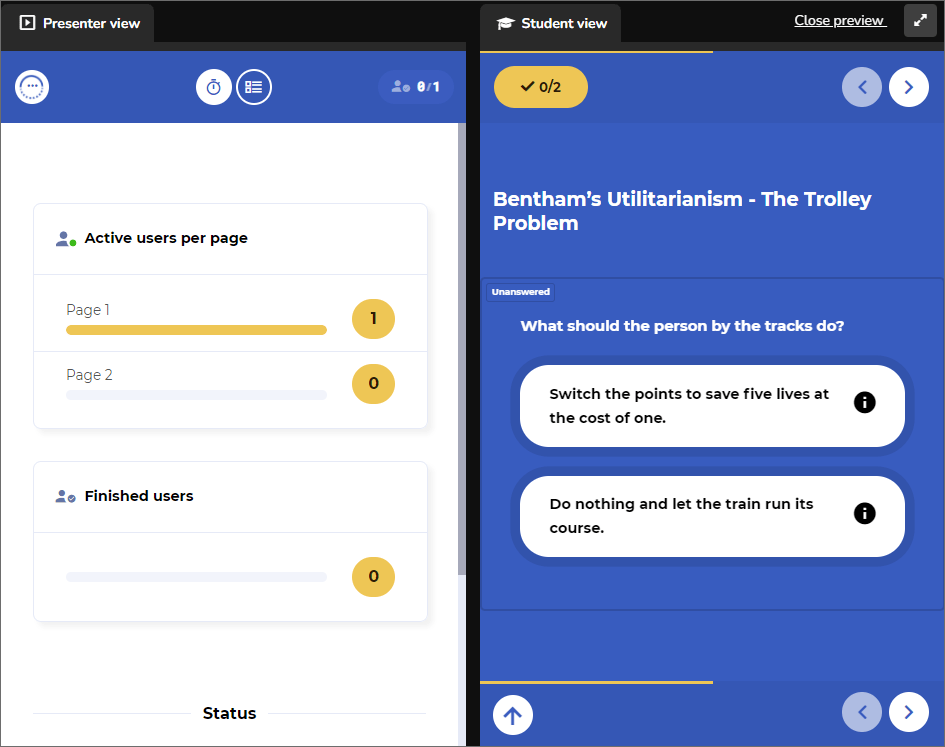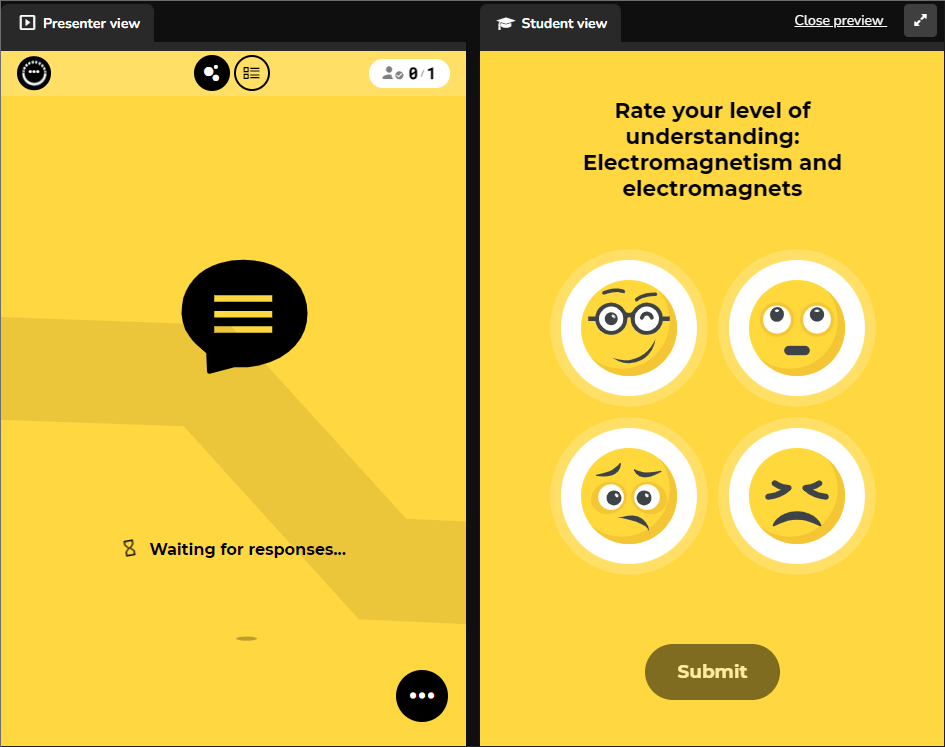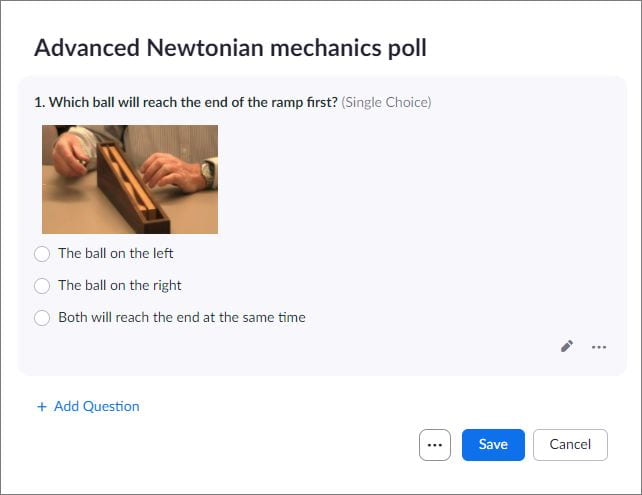Polling tools
Polling tools support these learning types (see definitions):
Polling tools help make classes lively, providing a means for feedback, enabling students to direct the learning, and allowing even the shyest of students the comfort of anonymity while also feeling engaged.
These systems can support interaction through
- A teacher-led poll to which students provide their response to a multiple-choice question.
- A Q&A scenario where students ask questions that can be answered in-class by the teacher.
Which tools?
In 2022, H5P polling (emoji and word clouds) and Zoom polls were ‘new kids on the block’; a round of beta testing ensued. Since then they have moved well beyond the testing phase and are now our top recommendations for in-class polling.
H5P
Options for H5P polling tools are as follows:
Multipoll
Teachers create true/false or multiple-choice polls. Polls can be a single question on one page or several questions across multiple pages. Responses are aggregated in real time and displayed on the presenter’s view; this can be projected on the screen as students submit their response, or once the poll is finished.
Emoji Cloud
Emojis accompany questions that are designed to elicit an emotional response. At present, only one question is possible per exercise and emojis are limited to a predefined selection of facial expressions.
Zoom polls
Polls are possible in Zoom meetings and can either be set up in advance or on the fly.*Adding a poll in advance can be done from the Zoom web client. It requires you to first schedule a meeting.Either schedule a new meeting or click on the name of a pre-scheduled meeting.
With the meeting details in view, scroll to the bottom and open the Polls/Quizzes tab. Click Create.
Standard polls allow for basic true/false and multi-choice questions only. Advanced polls allow for true/false, multi-choice, matching, ranking, short and long answer questions; images can also accompany questions.
Polls can contain more than one question. However if one question is to be asked at a time throughout your presentation, create one question per poll. Hosts will be able to control which question is asked via a drop-down list in the Zoom client.
For details see the documentation – Polling for meetings.
* Note: If you have a co-host helping you, and expect them to manage the poll, add them as an alternative host in advance. Edit the meeting settings and show the advanced options.
Others
In 2021 a working group evaluated ten web-based polling tools in order to recommend the following four. Consideration was given to cost, functionality (i.e., providing both instructor-led polls and student Q&A), ease of use, reporting, accessibility, data ownership, and Canvas integration. Treat these four as alternatives if the core University-licensed tools above are pedagogically inappropriate for your needs.
DirectPoll
Cost – A very basic free tool for supporting polling answers only. Limited to 500 people.
Supports – Teacher-led polls as MCQs. Multiple-answer MCQs are also supported.
Ease of use – Easy. No accounts are required for poll users, however, the instructor must submit an email address to receive emailed polling links (i.e., links to polls are generated and emailed). Polls are simple to create and shortened URLs and KewAr codes aid students. It supports a series of questions and has a dedicated ‘education’ help page for ideas relevant to classroom use, such as marking the correct answer and hiding the answer while polling.
Reports – All polls are deleted after 30 days from creation or last save.
Accessibility – No obvious information was found but a quick accessibility check identified no major issues.
Data ownership – Netcetera (DirectPoll) uses browser cookies to customise the tool to your preferences. They collect the email address of poll creators and share your data with other 3rd party companies.
Canvas integration – is not possible.
Notes – Embedding of polls is possible for PowerPoint slides (through the WebViewer Add-in) but not other presentation tools.
Socrative
Cost – Socrative is free for class sizes up to 50. The Pro version supports 200 students.
Supports – Polls with MCQs, true/false and short answers. The short answer question can be used for real-time Q&As with audience up-voting. This can be followed by a vote on the most preferred answer. Quizzes can be imported/exported and images can be embedded in quiz questions.
Ease of use – Instructors need to set up an account but the interface is fairly easy to use. Also easy for students as they simply need to enter the room name to be directed to the poll questions.
Reports – The free version has the ability to download a subset of information from quiz templates (PDF), rosters (PDF) and quiz results (Excel). Full downloads are available with a Pro license.
Accessibility – Socrative does not directly accommodate learners with special needs, however, the website and app can work in concert with screen-magnifying and screen-reading software.
Data ownership – Socrative (Showbie Inc, Canada) uses browser cookies to customise the tool to your preferences. They collect the email address of poll creators and data about the course/users in setting up Rooms. It shares this data with 3rd party companies. See Socrative privacy policy.
Canvas integration – Socrative does not integrate with Canvas, nor presentation software such as PowerPoint.
Wooclap
Cost – The free account is limited to 2 questions per ‘event’ but an unlimited events can be created. Free events work with up to 1000 students. Single teacher accounts are inexpensive and charged per month. Pro licenses cost more but add only minor functionality improvements. Institutional licenses are required for Canvas integration or more than 1000 students at a time.
Supports – A wide range of question types (MCQs, ratings, polls, questions, click on image, word cloud generator, open questions, number guessing, prioritisation, sorting, matching, CLOZE, group brainstorm) and real-time discussions and Q&A (also ‘likes’ for up-voting).
Ease of use – Wooclap does not require registration for students – they can access an event via a URL or KewAr code. Teachers need to create an account in order to set up questions, but the interface is clear, direct, and easy to learn.
Reports – Teachers can view or display to the class the results of their questions and Q&As during or after the event, but they can only download those results (as a PDF or Excel sheet) with the Pro license.
Accessibility – Wooclap aspires to be WCAG 2.1 compliant but is only mostly successful at this stage. It is however compatible with screen readers.
Data ownership – Wooclap is hosted in Belgium and therefore complies with EU privacy directives. As with other online platforms, Wooclap collects login and usage data and uses it for service improvement purposes and shares that with named third-parties for service provision. See Wooclap privacy policy.
Canvas integration – Can integrate with Canvas’ rich text editor and Assignments but is only available with an institutional license.
Poll Everywhere
https://www.polleverywhere.com
Cost – There are 5 levels of pricing from free to ‘institutional’ license. Pricing varies on whether it is being used in an educational setting. The free version supports classes up to 40 people.
Supports – Both MCQ polls and real-time Q&A, with voting. There are several question types including word cloud, clickable image, survey, open ended questions, competition, and about a dozen more specific activity types.
There are quite a few options that can be configured (for example, limiting who can participate, the number of responses allowed per participant, hiding or showing polling responses, etc.) but the defaults work well.
Ease of use – Instructors need to create an account (sign-in with Google is an option). Once logged in, customize your account settings by choosing the ‘Higher Education’ option, which provides access to common question types. From the instructor dashboard, new activities can be set up easily from the provided options.
Students can join a poll by entering a short URL. They are prompted to provide a screen name but this is optional.
The real-time Q&A interface is easy for students and works well on a mobile device. Instructors can hide inappropriate responses with a single button click.
Reports – Poll Everywhere can provide detailed reports but these are not available with the free version. However it is possible to download a CSV spreadsheet of all of the raw responses. For a real-time Q&A, the report includes the number of up-votes and down-votes. For a polling MCQ, it includes a list of all individual responses.
Accessibility – Poll Everywhere has a page focused on the company’s accessibility efforts. The company notes that some teacher functionality is not fully optimised for keyboard use.
Data ownership – Poll Everywhere (USA) provides a webpage on data privacy and ownership. See Poll Everywhere privacy policy. There is a two-tier approach for registered and unregistered users. The company collects clickstream information and basic technical information like UDI, browser type, etc. The company maintains a list of 3rd party companies that it shares data with.
Canvas integration – Poll Everywhere can integrate with Canvas but only with an institutional license. Limited opportunities for using the free version with Canvas has been helpfully collated by the University of Melbourne.
Page updated 02/07/2025 (minor edit)








